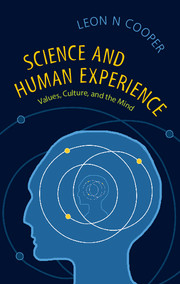Book contents
- Frontmatter
- Dedication
- Contents
- Preface
- Acknowledgement
- Part One Science and Society
- 1 Science and Human Experience: (Mephistopheles Is Alive and Well and Living in the Space Age)
- 2 Does Science Undermine our Values?
- 3 Can Science Serve Mankind?
- 4 Modern Science and Contemporary Discomfort: Metaphor and Reality
- 5 Faith and Science
- 6 Art and Science
- 7 Fraud in Science
- 8 Why Study Science? The Keys to the Cathedral
- 9 Is Evolution a Theory? A Modest Proposal
- 10 The Silence of the Second
- 11 Introduction to Copenhagen
- 12 The Unpaid Debt
- Part Two Thought and Consciousness
- Part Three On the Nature and Limits of Science
- References
4 - Modern Science and Contemporary Discomfort: Metaphor and Reality
from Part One - Science and Society
Published online by Cambridge University Press: 05 November 2014
- Frontmatter
- Dedication
- Contents
- Preface
- Acknowledgement
- Part One Science and Society
- 1 Science and Human Experience: (Mephistopheles Is Alive and Well and Living in the Space Age)
- 2 Does Science Undermine our Values?
- 3 Can Science Serve Mankind?
- 4 Modern Science and Contemporary Discomfort: Metaphor and Reality
- 5 Faith and Science
- 6 Art and Science
- 7 Fraud in Science
- 8 Why Study Science? The Keys to the Cathedral
- 9 Is Evolution a Theory? A Modest Proposal
- 10 The Silence of the Second
- 11 Introduction to Copenhagen
- 12 The Unpaid Debt
- Part Two Thought and Consciousness
- Part Three On the Nature and Limits of Science
- References
Summary
Has modern science made our universe “an unbounded theater of the absurd,” or is this anxiety misplaced? What do we mean by “the scientific method,” and how does it differ from other methods of understanding our world? Is science a description of reality? Is it metapor or truth? Who decides what science is, and what is to be taught in class rooms?
This essay is based on an essay originally written for The Rights of Memory: Essays on History, Science and American Culture, edited by Taylor Littleton, and published by University of Alabama Press in 1986. It is based on a lecture given at Auburn University.
1
Robert Penn Warren has spoken on “the use of the past.” One such is surely to situate the present. If for science the present seems unfriendly we might, for comfort, recall the inscription on the dome of the great hall of the National Academy of Sciences in Washington:
TO SCIENCE PILOT OF INDUSTRY MULTIPLIER OF THE HARVEST EXPLORER OF THE UNIVERSE REVEALER OF NATURE'S LAWS ETERNAL GUIDE TO TRUTH
The nineteenth-century optimist who wrote these words is, alas, no longer with us. Instead we have the professional demonstrator, the fundamentalist preacher, and the moralist legislator. Perhaps it is too much to say that we have fallen on the winter of our discontent.
But there are cold winds that blow from Washington, and the chill of indifference, even hostility, from the country as a whole, makes it somewhat unlikely that these words would be written today.
- Type
- Chapter
- Information
- Science and Human ExperienceValues, Culture, and the Mind, pp. 41 - 56Publisher: Cambridge University PressPrint publication year: 2014

